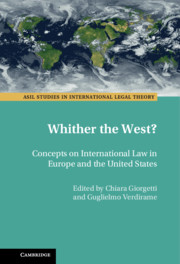Book contents
- Whither the West?
- ASIL Studies in International Legal Theory
- Whither the West?
- Copyright page
- Contents
- About the Authors
- Acknowledgements
- Introduction
- I The Idea of International Law in the Divided West
- II Specific Areas in International Law: Whither the West?
- 1 International Law and Constitutional Law: Is There a Final Arbiter?
- 5 Authority and Dialogue
- 6 Treaty Conditions and Constitutions
- 2 International Adjudication and the Development of International Law
- 3 International Law and the Use of Force
5 - Authority and Dialogue
State and Official Immunity in Domestic and International Courts
from 1 - International Law and Constitutional Law: Is There a Final Arbiter?
Published online by Cambridge University Press: 29 April 2021
- Whither the West?
- ASIL Studies in International Legal Theory
- Whither the West?
- Copyright page
- Contents
- About the Authors
- Acknowledgements
- Introduction
- I The Idea of International Law in the Divided West
- II Specific Areas in International Law: Whither the West?
- 1 International Law and Constitutional Law: Is There a Final Arbiter?
- 5 Authority and Dialogue
- 6 Treaty Conditions and Constitutions
- 2 International Adjudication and the Development of International Law
- 3 International Law and the Use of Force
Summary
States have taken different approaches to incorporating relevant jurisdictional immunities into their domestic legal systems. Some common law countries have adopted foreign state immunity acts that codify jurisdictional immunities as a matter of domestic law. Other civil law countries, such as Italy, apply rules of foreign state immunity based on customary international law more directly. At the same time, domestic courts have adjudicated disputes related to jurisdictional immunities by interpreting and applying their domestic laws against the backdrop of international law and the customary international law norms that govern the contours of foreign state and foreign official immunity. Assessing challenges brought before international tribunals to immunity determinations made by domestic courts in Europe is helpful, and specifically a challenge brought by individual claimants before the European Court of Human Rights to the United Kingdom’s determination that Saudi Arabia was entitled to jurisdictional immunity from civil claims for torture, and a challenge brought by Germany before the International Court of Justice to Italy’s determination that Germany did not enjoy jurisdictional immunity from civil claims for World War II–era crimes. Domestic courts in Canada and Italy subsequently considered these decisions in reaching their own conclusions about the scope of foreign state immunity under their domestic statutes. This examination shows that immunity cases defy categorization along a European/ North American divide.
Keywords
- Type
- Chapter
- Information
- Whither the West?International Law in Europe and the United States, pp. 115 - 145Publisher: Cambridge University PressPrint publication year: 2021

